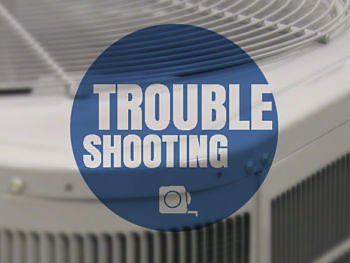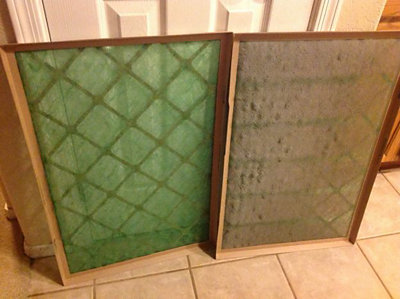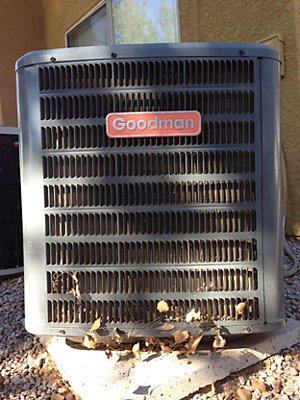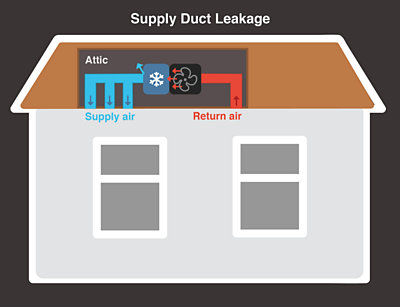Why Is My Air Conditioner Not Cooling My House Below 80 Degrees?

So, you set your AC thermostat below 80 degrees but noticed that your air conditioner’s having trouble reaching your set temperature. In fact, it seems your AC has trouble hitting any temperature below 80 degrees.
And you’re getting a little hot and bothered (literally).
So, what’s the issue? Well, certain problems can prevent an air conditioner from properly cooling down your home including:
- A dirty air filter
- A blocked condenser
- A refrigerant leak
- An undersized AC
- Leaky ducts
- An older AC
But here’s the tricky part: there’s always the possibility that nothing’s actually “wrong” with your AC— maybe you’re just pushing the limitations of your system.
So how do you know which is your situation? Well, you can start by checking the outdoor temperature when you notice your AC struggling. See below for a more in-depth explanation.
Need a tech to figure out the problem ASAP? Just contact us and we’ll send one right over.
First off, is the outdoor temperature above 92 degrees?
If so, there might not be any “problem” with your AC system. You see, every geographical area has what’s called a 1% summer “design temperature”. Your location will exceed this temperature only 1% of all the hours in a year (based on a 30-year average). And according to the Environmental Protection Agency, Sarasota’s summer design temperature is 92.
So, what does that mean?
Well, it means that if you live in Sarasota and your AC only struggles on abnormally hot days (days above 92 degrees), it’s likely because your AC was only designed to provide optimal comfort when the outdoor temperature is under 92 degrees.
If this is the case for you, we suggest pairing your AC with a fan (ceiling or oscillating) to keep you cool.
Remember: Sarasota only hits these abnormally hot days around 1% of all the hours in a year so while they might be uncomfortable, those above-92-degree days are few and far between!
But, of course, if your AC is struggling to cool your home and it’s below 92 degrees, you most likely have one of the problems listed below.
If the temperature is below 92 degrees check for these AC problems....
A dirty air filter
Your air filter is designed to trap contaminants in the air before it gets pulled into the AC system. But over time that means that your filter gets dirty and clogged. And if a dirty filter isn’t replaced, it can seriously limit your AC’s cooling power.
What to do:
Check your air filter every month or so. Change it when it looks like the filter to the right (in the pic below).

A suffocating condenser
Your condenser is in charge of collecting all the heat from inside your home and dumping it into the outdoor air. But in order for that “heat dumping” process to take place, your condenser needs plenty of breathing space around it. Otherwise, all that collected heat will just get blown right back into your home, making it impossible for the AC to ever reach temperatures below 80 degrees.
What to do:
Check the area around your condenser for any shrubbery, fences or debris that might be blocking your condenser’s breathing space. And, for the love of your wallet and AC system, never use a condenser cover.
Also check for dirt or leaves that may have built up on your condenser coils. Rinse dirty condenser coils with a hose on a gentle setting or use a coil cleaner like this.

Dirty condenser coils can make your home uncomfortably warm.
A refrigerant leak
Your refrigerant is the special chemical that cools the air inside your home. So, if there’s a leak and your system eventually becomes low on refrigerant, your AC will be extremely limited in how much cooling it can provide.
What to do:
Check for the signs of a refrigerant leak:
- Ice on refrigerant lines
- Frozen evaporator coil
- Hissing or whistling noise coming from refrigerant lines
- Higher-than-normal energy bills
If you notice any of these signs, have a professional locate and repair the refrigerant leak and then recharge your system with more refrigerant.
An undersized AC
If your AC is too small for your home, it likely will always struggle to reach your set temperature.
You see, ACs are sized in tonnage (1 ton, 2 tons, 3 tons, etc.). The larger the tonnage the more cooling it can provide in a certain timeframe. A quality tech will always perform a Manual J calculation to determine the size AC your home needs. Related: How Do I Know What Size Central Air Conditioner I Need for My Home?
But if your tech cut corners (i.e., only looked at square footage when sizing your AC), they may have sized your AC improperly. And if the AC is undersized, it might run all day but never properly keep up with the heat that’s entering your home via windows, doors, cracks, etc.
What to do:
Have a professional perform a Manual J calculation to determine if your air conditioner is too small for your home. If your AC is undersized, upgrade to the size your professional suggests.
Leaky ductwork
Your air ducts deliver cool air to different areas of the home. So, if there are leaks along the ductwork that allow cold air to escape into the attic or basement, your home won’t get as much cool air as it needs to reach your set temperature.

Air ducts with leaks allow conditioned air to escape into unconditioned areas (i.e., the attic). The more leaks your air ducts have, the less cool air your home gets.
What to do:
Have a professional inspect your ductwork for leaks. If needed, they can provide duct sealing services to make those ducts airtight.
You have an older AC (that needs to be replaced)
Just like an old car loses power and efficiency over time, an older AC may not be able to properly cool your home as well as it did when it was first installed.
According to Energy Star, if your AC is older than 10 years old, you should think about replacing it. Not only will a newer AC ensure your home reaches sub 80-degree temperatures, but it can also save you up to 20% on cooling costs.
What to do:
If your AC is older than 10 years old, have a professional inspect your home to see how much you could benefit from replacing your AC with a newer model.
Need advice from an AC repair expert in Florida?
If your AC can’t cool your home below 80 degrees, we can help you determine the problem and fix it. Just contact us and we’ll send over a trusted tech to diagnose your AC system. We serve several communities in Florida including Sarasota, Tampa Bay, Orlando, Naples, Cape Coral and the surrounding areas. View our full-service area.
Posted in: Troubleshooting